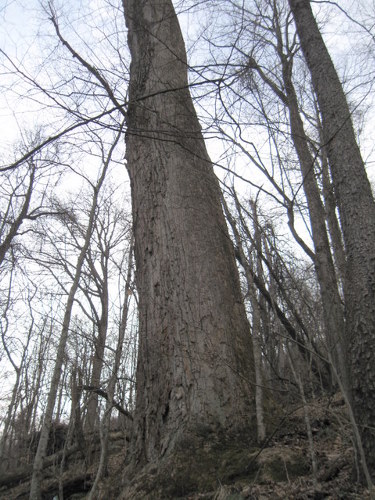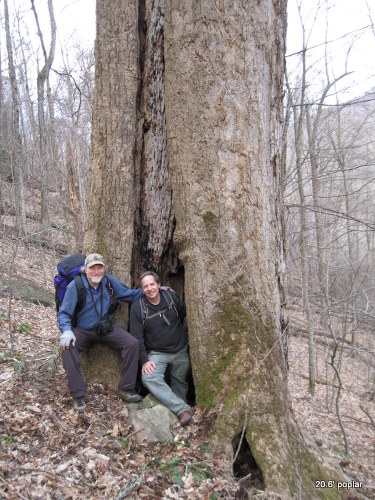|
ENTS,

On February 10th, 2009, Brent Martin, Hugh Irwin and I went on an
outing to
Wright Creek in Graham County, NC to investigate a proposed US
Forest
Service logging project there. Across the stream from the uppermost
logging
unit on Wright Creek we noticed some thick-limbed, emergent crowns.
The
riparian area itself had large trees and lacked the cut stumps, skid
trails and vine tangles that charachterized the second growth
forests we had
seen that day.
Crossing the creek, I was impressed with the beauty and elegance
of the
old-growth remnant we entered. With a NE aspect at 3300' in a
mountain
range that gets 80 inches of rain, the green, lush moss on tree
trunks and
boulders was striking. The scattered, huge trees made 2-3 foot
diameter
individuals look small. Canopy trees in the stand include northern
red oak,
tulip poplar, white ash, buckeye, sugar maple and silverbell.
The first tree we visited was a 14.2' x127' northern red oak. The
straight
bole of this tree is enough to make any lumberman salivate. The
next biggy
was a 15.7' in cirumference red oak with a lean and a flared base.
Upslope
was a 4'+ dbh white ash that I did not measure. Traversing the
slope we
came to a 14.4' x~150' poplar. I shot straight up into this tree
with my
range finder and got 48 yards, so it is likely a little taller than
150 and
also the tallest tree in the stand. Within site of the first poplar
was an
even larger one. Within 50 ft. I knew it was in the range of the
biggest
individuals I have seen. Our taping of this tree put it at 20.6' in
circumference. I did not measure its height, but it was in the
canopy which
would put it in the 20x100 club. It is a massive tree, though more
ovoid
than columnar, and is not in contention for any volume records.
Just above this tree was a Forest Service skid trail and the
tangle of vines
and saplings from logging in 1968. This 5 acre patch turned out to
be
the lowest elevation bit of a 130 acre remnant of old-growth at
Wright
Creek. As far as I can tell, everything upstream of 3300' elevation
was in
old-growth condition when the tract was purchased by the Forest
Service in
1937. In 1967 and 1968, the Forest Service liquidated almost 1000
acres
of forest that was almost certainly in old-growth condition, most of
it
above a 100' waterfall and gorge that blocked access to the
gentle topography of upper Wright Creek. Fortunately, a fragment was
left
for the next "entry" into Wright Creek and survives today. The
northern
hardwoods forest and hemlock forest above the falls is just as
impressive as
the rich cove below the falls and includes many large yellow birch,
hemlock,
red oak, and black cherry.
The 20' poplar is only the second single stemmer I know of
outside
the Smokies. Both are from the Santeetlah Creek watershed. The one
on
the Poplar Loop has celebrity status while the individual at Wright
Creek is
little known up till now. If anyone would like to visit this spot, I
will be
leading a hike to it on May 2nd. Details at
www.safc.org.
Josh



Continued at:
http://groups.google.com/group/entstrees/browse_thread/thread/24c052b749b347f6?hl=en
|